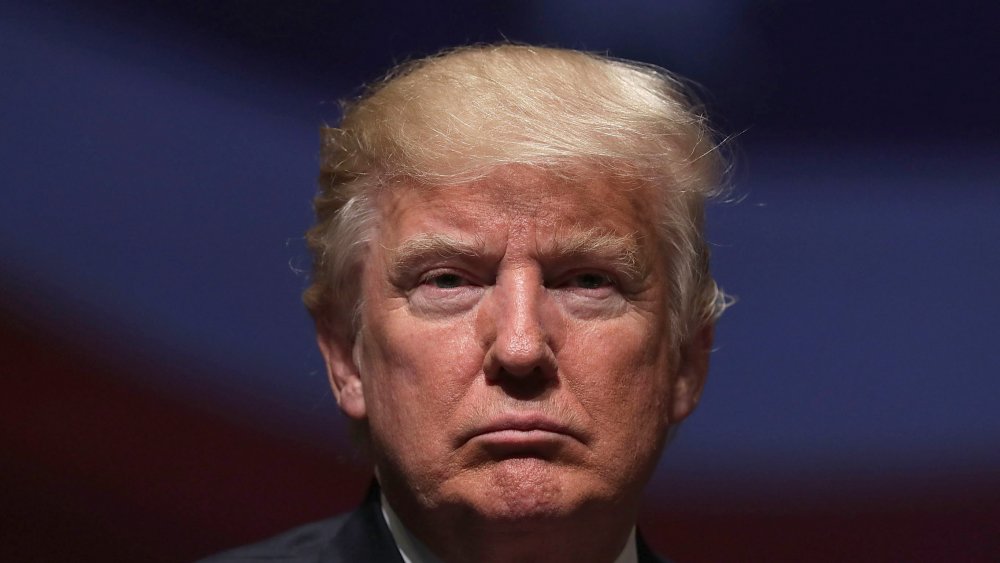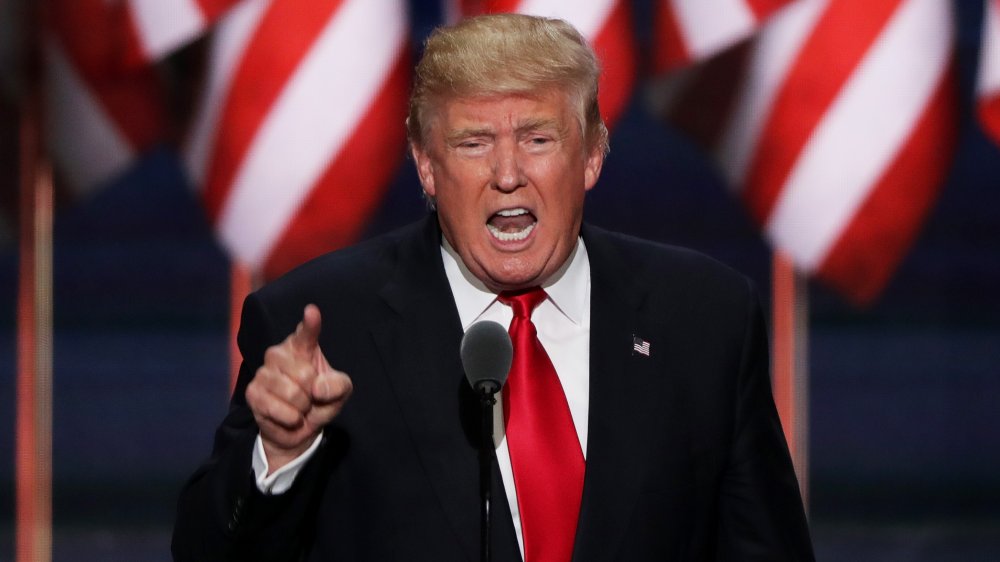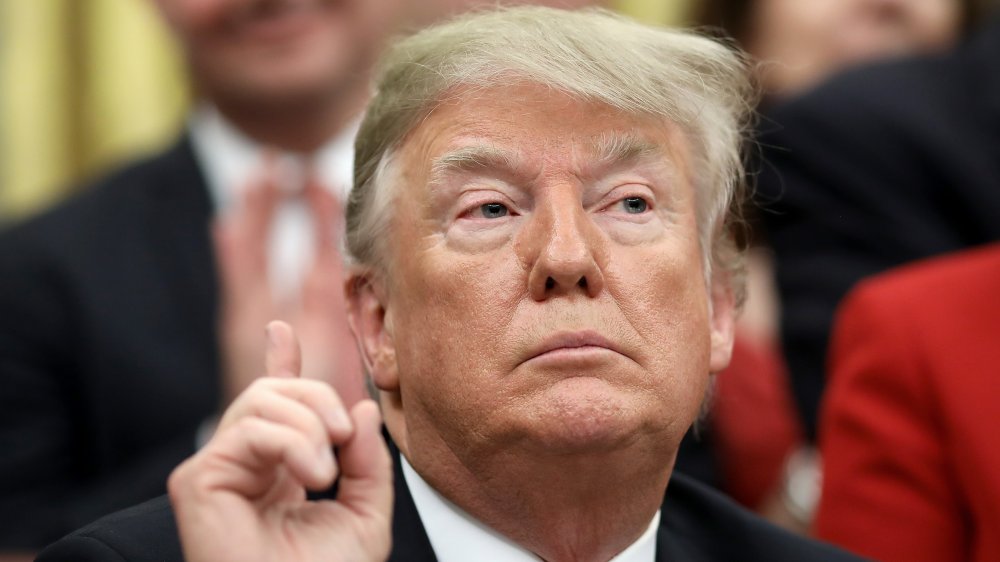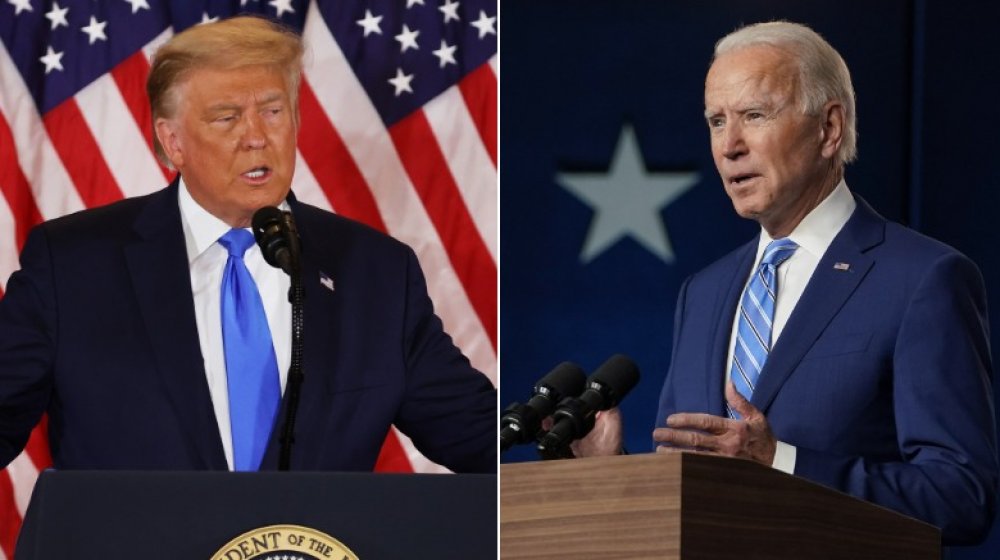If Trump Refuses To Concede, Here's What Happens Next
It's an American tradition that when one presidential candidate loses the election, that person publicly (and promptly) admits their loss in a concession speech. At least, this is the normal way of things. As USA Today put it, "No presidential candidate in modern history has refused to concede."
Why is this tradition important? According to NPR, concession "means you are stating the obvious: that it appears the election cannot be won." Interestingly, as USA Today pointed out, a concession speech isn't actually a part of the U.S. Constitution. It is a voluntary action.
Looking at the tight race in the 2020 presidential election between Republican incumbent Donald Trump and Democratic challenger Joe Biden, it seems fair to ask: What will happen if Trump loses but refuses to concede? It's doubly fair, considering the fact that in the early hours on Nov. 4, 2020, Trump falsely announced that he won the whole thing while votes were still, in fact, being counted.
With Trump so set on winning, here is what will actually go down should he refuse to concede to Biden.
Donald Trump could contest the results for a while
In 2020, researchers created the Transition Integrity Project, which was made to "study scenarios" that could compromise the integrity of the 2020 presidential election, according to USA Today. It's a useful tool since Donald Trump himself said on Nov. 4, 2020, that he'll take the election to court. "We want the law to be used in a proper manner so we'll be going to the U.S. Supreme Court," he said, per Newsweek.
According to the Transition Integrity Project, "As a legal matter, a candidate unwilling to concede can contest the election into January." The project adds that problems were expected in the 2020 election: "We anticipate lawsuits, divergent media narratives, attempts to stop the counting of ballots, and protests drawing people from both sides." If Trump loses but refuses to concede, the nation could be in a constitutional crisis that forces courts to deal with aspects of constitutional law rarely used. Not to mention, a refusal to concede could lead to nationwide — and possibly global — unrest.
Plus, there's the issue of power at play. As Rosa Brooks, a co-founder of the Transition Integrity Project, explained to FiveThirtyEight, "You have just a tremendous differential between the president of the United States of America, who has just awesome coercive powers at his disposal, and a challenger who really has no power whatsoever." What could this mean, exactly? As Brooks put it, "Joe Biden can call a press conference; Donald Trump could call on the 82nd Airborne."
Congress could play a role in determining the next president
While it's unclear if President Donald Trump will refuse to concede if he loses the 2020 presidential election, we do know that he is not going to let the race go without a fight. As stated above, Trump has threatened to take the election to the Supreme Court and already has already filed lawsuits in several states. What happens if the ballot recounts and lawsuits persist long after Election Day?
There is a process already set in place to contend with those circumstances. According to The New York Times, the House of Representatives gives one vote to each state if the Electoral College is to determine the presidential winner. The deadline for Congress to confirm a winner is Jan. 6, 2021. If it does come to that, Speaker of the House Nancy Pelosi says lawmakers are ready. "But let's not worry about that right now. We're ready. We're prepared," she told NPR's Al Shapiro in an interview prior to Election Day.
If Trump loses the election, could he really truly refuse to leave the White House?
What does one do with a White House squatter?
President Donald Trump has previously been hesitant about endorsing a peaceful transfer of power if he does lose the election, as reported by CNN, so what happens if he declines to concede and also refuses to physically leave the place he so proudly called home the last four years. What if he becomes a White House squatter?
"I think we would have that Nixonian moment where a leadership team would travel to the White House to declare, 'Mr. President, it is over,'" former Republican National Committee chairman Michael Steele told the Boston Globe. In 1973, President Nixon became the only president in U.S. history to resign, due to his involvement in the Watergate scandal. "If you've got a president who's chained himself to the Resolute Desk," Steele said, "the new president would say, 'Would you go inside and get him out please?'"




